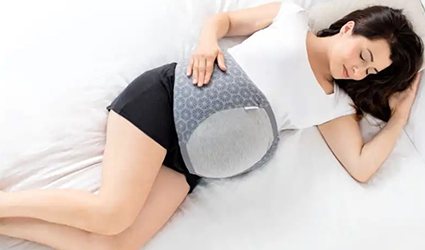Wearable Medical Device to Promote Maternal and Fetal Health in Late Pregnancy
September 4, 2018
Source: ScienceDaily
 1,727
1,727

Many pregnant women sleep on their backs during the late stages of pregnancy. This, a new study found, can increase the risk of stillbirths due to oxygen deprivation followed by improper breathing of the fetus. Though positional therapy is suggested by the physicians, there was no concrete prove up until now.
A research team from the University of South Australia in Adelaide conducted a study where they used a PrenaBelt as a positional therapeutic wearable medical device to promote both maternal oxygen saturation and fetal heart rate. By inserting a body position sensor in the PrenaBelt, the sleep position can be monitored to reduce supine sleep among pregnant women. The results were published in the Journal of Clinical Sleep Medicine dated Aug. 15, 2018.
Jane Warland, Ph.D., principal investigator and the associate professor at the School of Nursing and Midwifery from the University of South Australia, said "Our findings suggest that women can comfortably sleep wearing a device around their waist that effectively stops them from sleeping on their back. Using positional therapy to keep the pregnant mother off her back may reduce supine sleep in late pregnancy and may also provide both maternal and fetal health benefits, with minimal impact on maternal perception of sleep quality and sleep time."
Jane Warland further added, "Wearing a device that minimizes back sleep, and which is comfortable and doesn't impact the mother's sleep length or quality, may be a simple way to reduce stillbirth incidence, especially if the mother is at increased risk due to other factors."
Further research should be conducted to know more about the benefits and disadvantages of positional therapy in pregnancy cases.
By DduRead more on
- Things to Know before Buying Newborn Baby Incubators March 31, 2022
- Highly Resistant Food Poisoning Bug Responds to Antibiotics September 6, 2018
- 4 Wearable ECGs EKGs Monitor and Their Features September 5, 2018
- Smartphone Based Diagnosis to Identify Mosquitoes Transmitting Infection September 5, 2018
- 3 Natural Plant Extracts Manufacturers on Drugdu.com September 4, 2018
your submission has already been received.
OK
Subscribe
Please enter a valid Email address!
Submit
The most relevant industry news & insight will be sent to you every two weeks.



